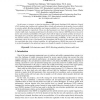Free Online Productivity Tools
i2Speak
i2Symbol
i2OCR
iTex2Img
iWeb2Print
iWeb2Shot
i2Type
iPdf2Split
iPdf2Merge
i2Bopomofo
i2Arabic
i2Style
i2Image
i2PDF
iLatex2Rtf
Sci2ools
JCIT
2010
2010
Call Admission Control Strategy for System Throughput Maximization Using DOVE
In this paper we propose a signal-to-interference (SIR)-based distributed Call Admission Control (CAC) strategy that considers the combined effect of both call and packet level quality of service (QoS) in wireless uplink. Blocking probability and outage probability are considered as call level and packet level QoS parameters respectively. These two QoS parameters are then investigated as functions of relative traffic load. A queuing model based on the delay of voice end-user (DOVE) protocol is used to derive state transition probabilities. The paper deals with the impact of amount of delay of end user on throughput for a particular offered traffic per user. It shows that throughput increases with increase in the amount of delay of end user for a given threshold blocking probability. At the same time, in the underload region, the rate of decrement of the throughput with decrease in the number of channels is less rapid than that of the overload condition. It is the application of DOVE t...
End User | JCIT 2010 | Packet Level | Throughput |
Related Content
| Added | 19 May 2011 |
| Updated | 19 May 2011 |
| Type | Journal |
| Year | 2010 |
| Where | JCIT |
| Authors | Tanzilah Noor Shabnam, Md. Imdadul Islam, M. R. Amin |
Comments (0)

